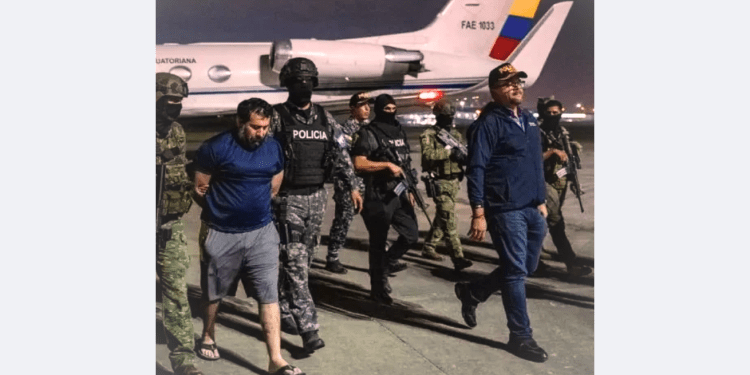Ecuador’s Drug Kingpin Fito Extradited to U.S.: Will This Stop the Violence or Trigger New Chaos?
Ecuador’s Most Infamous Drug Baron “Fito” Extradited to the United States: A New Twist in the Global War on Drugs
The notorious Ecuadorian drug lord Adolfo Macias, known as “Fito,” has been extradited to the United States to stand trial. Captured in June 2025 after his dramatic prison escape, Fito is now set to face justice in New York. His extradition marks a significant victory for international law enforcement but raises pressing concerns about Ecuador’s ongoing struggle against organized crime and its role in global drug trafficking networks.
Who is Fito? Ecuador’s Most Feared Crime Boss
Watch: Fito Extradition Operation Footage
Watch: Fito Extradition Operation Footage
Fito rose to infamy as the leader of Ecuador’s most violent gang, Los Choneros. For over a decade, he controlled Ecuador’s coastal regions through terror, orchestrating drug trafficking, violent robberies, and brutal killings. His criminal empire built strategic ties with Mexican cartels like the Sinaloa Cartel, turning Ecuador into a vital cocaine corridor to North America and Europe.
Despite multiple arrests, Fito’s influence only grew, as he operated his cartel from behind bars with impunity, organizing prison riots, contract killings, and drug shipments while enjoying a luxurious lifestyle within prison walls.
The Spectacular Prison Escape That Shamed Ecuador
In early 2024, Fito orchestrated a bold and shocking prison escape that embarrassed Ecuador’s security forces. Investigations later revealed rampant corruption within the prison system, with reports indicating the active involvement of prison officials and guards in facilitating his escape.
Following his escape, Ecuador witnessed an unprecedented wave of violence, including public shootouts and mass killings. Fito’s escape destabilized the nation so severely that it forced the government to declare a nationwide state of emergency.
The Manhunt That Spanned Borders
After months of intense operations involving Ecuadorian police, Interpol, and U.S. law enforcement, Fito was finally captured in June 2025. Intelligence sources confirmed that he used an extensive network of corrupt officials and safe houses to avoid capture.
His arrest was hailed by Ecuador’s President as a “decisive blow” to organized crime. However, security experts caution that Fito’s removal may not stop the violence as other gangs are already vying to fill the power vacuum.
Why the United States Took Custody
Fito was officially extradited to the U.S. in July 2025, where he faces charges of drug trafficking, racketeering, and conspiracy to commit murder. Prosecutors allege he ran a multi-billion-dollar cocaine operation through Ecuadorian ports directly targeting the U.S. East Coast.
American authorities insisted on Fito’s extradition due to the high levels of corruption in Ecuador’s judiciary, ensuring he will be tried in a transparent legal process. His upcoming trial in New York is expected to dismantle his transnational criminal network and halt his influence within Ecuadorian prisons.
What’s Next for Ecuador?
While the extradition is celebrated globally, analysts warn that Ecuador may face a fresh surge in gang wars. History shows that the arrest of powerful cartel leaders often leads to bloody power struggles among rival groups.
Already, intelligence reports indicate rising tensions between gangs such as Los Lobos and Los Tiguerones who are eager to seize control over the lucrative drug routes previously dominated by Los Choneros.
The Ecuadorian government has announced major reforms focused on fixing its broken prison system, tightening coastal security, and enhancing cooperation with international allies. However, past failures raise doubts about whether these reforms will be effectively implemented.
A Global Signal in the War on Drugs
Fito’s extradition sends a clear message to Latin American criminal organizations: the United States will take direct action against cartel leaders threatening its national security. This case also highlights growing cooperation between Latin American countries and the U.S., particularly with agencies like the DEA.
However, experts argue that arresting one drug lord does little to solve the deeper socio-economic issues fueling the drug trade. Real solutions require long-term investments in economic development, social programs, and institutional reforms to tackle poverty and corruption at their roots.
Conclusion
Adolfo “Fito” Macias’s capture and extradition is a remarkable win in the global war on drugs but represents just one battle in a much larger fight. Ecuador now faces a critical test—whether it can turn this moment into genuine reform or fall back into deeper violence.
As the world watches closely, Ecuador’s actions in the coming months will determine if this extradition ushers in a new era of law enforcement or sparks further bloodshed in its streets.

